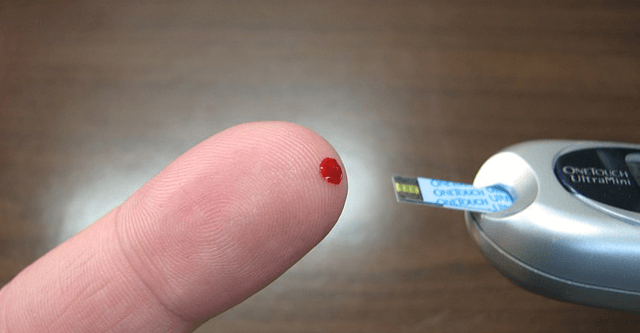Last Updated on April 24, 2023 by Dr Sharon Baisil MD
Our body forms from billions of cells. To create energy, the cells need energy in single units known as glucose.
When we consume something, it breaks down into a simple carbohydrate form known as glucose. Glucose gives the energy to our body required daily to perform activities of daily life.
Diabetes mellitus

A chronic disease that interlinks with Diabetes mellitus is a disease in which the blood sugar level rises up high.
After having a diet in a great amount, the food will convert carbohydrates into high levels of sugar and it results in severe health issues in the body of a person.
Sugar isn’t capable of transferring itself into the cells. The pancreas organ of our body produces insulin into the blood, and then blood helps as a “key,” to transfer sugar into each and every cell to create and utilize energy.
The blood and blood vessels are the pathways which help to transfer sugar from where it forms (i.e. stomach) or where it is manufacturing (i.e. in the liver) to the cells of our body (i.e. where our body uses i.e. muscles) or where it stores (i.e. fat tissues).
When sugar enters the bloodstreams into the cells of our body, the level of blood sugar minimizes.
Without the presence of insulin, or the help of bloodstreams sugar can not enter in any cell of our body to utilize as energy, This leads to a rise in sugar level.
The condition in which the blood sugar level rises will lead to high blood sugar or hyperglycemia.
Diabetes impacts how the body of a person uses blood glucose.
Glucose is essential for the health of people because it’s a significant resource of energy for the cells of the body which creates our body’s muscles and tissues of our body.
It’s the main source of energy for the brain too. Glucose produces in our body from:
- Diet
- Liver
Blood streams consume sugar and after its transfer into the cells of our body, with the help of insulin.
And then the liver stores glucose in a complex form of glucose known as ‘glycogen’ and creates glucose.
When the body lowers the blood sugar levels, for example, people are not eating food for a while, the liver of their body catabolizes (breaks down) the complex form glycogen into simple form glucose to balance the blood glucose levels in a normal range.
Diabetes happens because of these mechanisms:
- The body produces an insufficient amount of insulin hormone with the help of the pancreas gland and helps to lower blood sugars- Depend on insulin- type 1
- Insufficient sensitivity of cells after the action of insulin on the body- Do not depend on insulin-type 2 diabetes.
People with diabetes disease have to remember this essential information about the values of the blood sugar in the target range because it will help to regulate the blood sugar level after consuming the nutrient-rich diet. People often need to check their blood sugar levels a few times a day.
The health care personnel will perform a blood test called A1C to check that the blood sugar level is in balance or low or high for better precautions.
Diabetes helps to prevent the body of a person from consuming energy from the diet properly either the reason the body can not produce insulin in adequate amounts or the body can not use the insulin or react on the production of insulin correctly.
Signs and symptoms
- The first symptom occurs in diabetes that relates to high blood sugar levels, and loss of sugar monomers(glucose) while urination.
- Great amounts of glucose while urination can result in more urine output and sudden urination and results in the condition of dehydration.
- The dehydration may increase thirst and urges to drink more water.
- The relative insulin inadequacy results in a weight loss of the body.
- When the weight is lost then the person feels to eat more.
- Fatigue
- Nausea
- Vomiting
- Infections of the bladder, skin, and reproductive areas
- Variations in blood sugar levels can result in weak or blur vision.
- Adverse levels of high blood sugar can result in a condition of lethargy and in severe cases it can lead to coma.
Types of diabetes mellitus
The most common types of diabetes are-
- Type 1,
- Type 2,
- Gestational diabetes.
TYPE 1 DIABETES MELLITUS

Basically in this type of diabetes one’s body gets a command to make insulin by itself immune system.
Predominantly, the cells which are responsible for making insulin in your pancreas get attacked by your immune system itself.
This type of diabetes is generally detected or recognized in children and young aged persons, however, it can appear at any age bar.
Insulin pills are to be taken by the patients regularly to stay alive and much better vaccinated.
TYPE 2 DIABETES MELLITUS:

Similarly, type 2 DIABETES MELLITUS is also Stopped making insulin or stopped using it as well.
There is no surprising fact in type 2 that it can develop in any age bar even if you are in childhood.
The immune system plays an important role in this type of diabetes mellitus.
It can be developed due to a low immune system even in childhood.
Type 2 is the most popular type of Diabetes mellitus.
Gestational diabetes mellitus
Generally the third and the last type of diabetes recognized in some women when they are pregnant.
In most cases, this type of diabetes is temporary until the baby was born.
Although if you have this type of diabetes you probably have a chance to recognize it in later life too.
This type of diabetes mellitus is known as Gestational Diabetes.
Functioning and the production of insulin in the pancreas.
The alterations of glucose in the blood and the hormone responsible for the lowering of sugar (Insulin-Pancreas) in humans during the normal diet of a day with three meals.
Beta cells present in our pancreas are responsible for the normal release and the functioning of insulin hormone.
Production of this hormone in the pancreas is fickle steady through the cells.
Its production and functioning are activated by the means of a human only. Predominantly, the food which contains high glucose substances.
Some other better ideas to stay away from high/lower blood sugar at night
Keeping in mind the real cause of diseases, that is high blood sugar or we call it hyperglycemia, it becomes easier to sort the foods good for diabetics. Here are some ideas.
Try having a low carb diet.

Avoid eating rice, all-purpose flour, etc. Try healthier alternatives like oats. Prefer wheat flour over all-purpose.Try dividing your meal into 5–6 portions throughout the day. This helps in preventing the “glucose spike” followed by an “insulin spike” which is already insufficient in the body. Diabetics can’t handle excess glucose in their blood at once.
Avoid fats.

Especially saturated fats. Switch to olive oils. Avoid deep-fried street as well as home food. Eat foods that are rich in unsaturated fats like avocados, eggs, fish, walnuts, flaxseeds.
Say NO to sweet.

Anything that is sweet as sugar and sugar is not allowed. Yes, you can use artificial sweeteners but they have to be used less often. Avoid sweet dishes forever. Save the artificial sweeteners for beverages like tea coffee. Eat vegetables. Vegetables not only give sufficient amounts of carbohydrates, but they are also a source of vitamins, minerals, and fiber. Avoid vegetables like potatoes that contain high starch. Never starve yourself. If you are planning for a weight loss, consult a dietician or your diabetologist.
Link between diabetes and sleep
If the blood sugar level rises overnight.
High blood sugar ranges can motivate regularly occurring urination. When an excess of glucose is present in our body, it needs more water from body tissues. This leads to dehydration.
Signs- affects the sleep
- Shivering,
- Dizziness,
Many sleep disorders occur and other health issues often occur in people with diabetes.
Sleep Apnea
This is the most common sleep syndrome in people with diabetes. Sleep apnea occurs when respiration stops and starts many times during the night. Sleep apnea is more usually located in people with type two diabetes. This leads to excess weight, which restricts the air passage for respiration.
Common signs-
- Encompass feeling tired in the course of the day and snoring at night.
- Reaching a healthy weight for your physique might also help relieve your symptoms. You can additionally put on unique masks for the duration of sleep to amplify air strain to your throat and permit you to breathe easier.
Restless leg Syndrome
- RLS is a disorder to move your legs. It mostly occurs during the night, which leads to falls or makes it difficult to continue to sleep.
- RLS happens because of the insufficiency of iron content in our body.
- Risk factors-
-High blood sugar levels, -Kidney problems
-Thyroid disorders.
Insomnia
- Insomnia is a type of sleep disorder it can cause many types of sleep disturbance such as:
-Trouble in sleeping
-Difficult to sleep for more time.
-Wakes up early before the time.
-When people wake up without any freshness.
- In this order, people do not get sufficient sleep and people may suffer from irregular sleep periods.
- Insomnia occurs because of metabolic disruption due to diabetes disease.
- There is one more reason for insomnia is that the blood sugar level in the body is high.
- Seeking therapy with a scientific expert can also assist you to decide what’s triggering the problem.
Ways to lower the blood sugar levels Overnight
Check Your Blood Sugar Before Bed
If your blood sugar ranges are low at bedtime, devour a healthful snack before going to sleep.
Symptoms of hypoglycemia usually improve when the level of blood sugar lowers about 70 mg/dl.
Some symptoms are:-
- Shivering,
- Sweating,
- Confusion,
- Erratic behavior,
- Headache,
When midnight hypoglycemia occurs, people may often feel these symptoms or the response of the body towards these symptoms will result in hyperglycemia.
Talk with your medical doctor
About methods to apprehend dead night hypoglycemia, mainly if you think you may additionally have a situation detecting it. “It’s a hazardous condition due to the fact humans can’t inform when their blood sugar has dropped, because they may also now not have symptoms,”
Don’t Skip Dinner
Skipping dinner or having only a mild supper is one of the most common motives of an hour of darkness dips in blood sugar. Eat a healthy, well-balanced dinner each night and pay interest to component sizes.
Avoid Excess Exercise in Late Nights-
Doctors always advise you to work out every day, but adverse exercise before going to the bed is bad for diabetics because of the reason that it causes rapid fluctuations in blood sugar levels to decrease overnight.
If you still want to do exercise before going to sleep then prefer 2 hours before going to bed for better sleep.
Limit Alcohol at Night
Alcohol consumption can additionally expand the hazard for dead night hypoglycemia, so avoid normal consumption of alcohol.
Concluding the question is it possible to lower the blood sugar level overnight so the response is ‘yes’, start taking immediate precaution.
Conclusion
For the overnight treatment, these strategies may help
- Take a walk if you feel any symptoms.
- Adjusting the doses of insulin at night.
- Control the carbohydrate consumption on a regular basis.
- Increase the fiber content in the daily diet.
- Drink more and more water to reduce the risk of dehydration.
- Choose food that has low values of the glycemic index.
- Check sugar levels daily to regulate the blood sugar level.
References
- https://care.diabetesjournals.org/content/38/7/1205.short
- https://jamanetwork.com/journals/jama/article-abstract/1734701
- https://ieeexplore.ieee.org/abstract/document/5342789
- https://www.sciencedirect.com/science/article/pii/S008525381559008X
- https://care.diabetesjournals.org/content/37/1/9.short
- https://www.sciencedirect.com/science/article/abs/pii/S0022347604000307
- https://www.ncbi.nlm.nih.gov/pmc/articles/PMC3821052/





